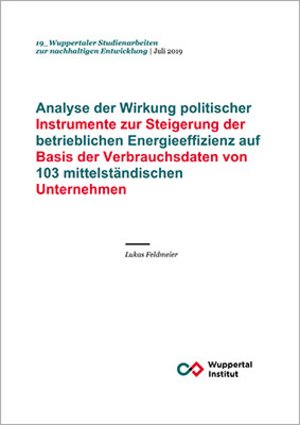Analyse der Wirkung politischer Instrumente zur Steigerung der betrieblichen Energieeffizienz
Auf Basis der Verbrauchsdaten von 103 mittelständischen Unternehmen

The purpose of the present thesis is to find out which political instruments like subsidized and obligatory energy consultings, grants for more efficient plants or higher prices have an impact on the energy efficiency of companies.
The study is based on an analysis of the question if and why energy efficiency should be considered as an independent goal as opposed to a classification as a means to the end of climate protection.
For the subsequent quantitative analysis, data from the project Energieeffizienz Impulsgespräche of the Rationalisierungs- und Innovationszentrum der Deutschen Wirtschaft (RKW) e.V. for the period between 2011 and 2013 is used and compared with newly generated data from 2017 for the same enterprises. For this purpose, a difference-in-differences-approach is used. The results show that while other variables – with the exception of the total volume of sales - don’t improve energy efficiency at all or at least not significantly, prices at least partly show a positive impact on energy efficiency. As a consequence, the author is recommending a stronger focus on market-based instruments in energy efficiency politics.
Lukas Feldmeier:
Analyse der Wirkung politischer Instrumente zur Steigerung der betrieblichen Energieeffizienz auf Basis der Verbrauchsdaten von 103 mittelständischen Unternehmen
Wuppertal 2019, ISBN 978-3-946356-15-8
(Wuppertaler Studienarbeiten zur nachhaltigen Entwicklung no. 19)
